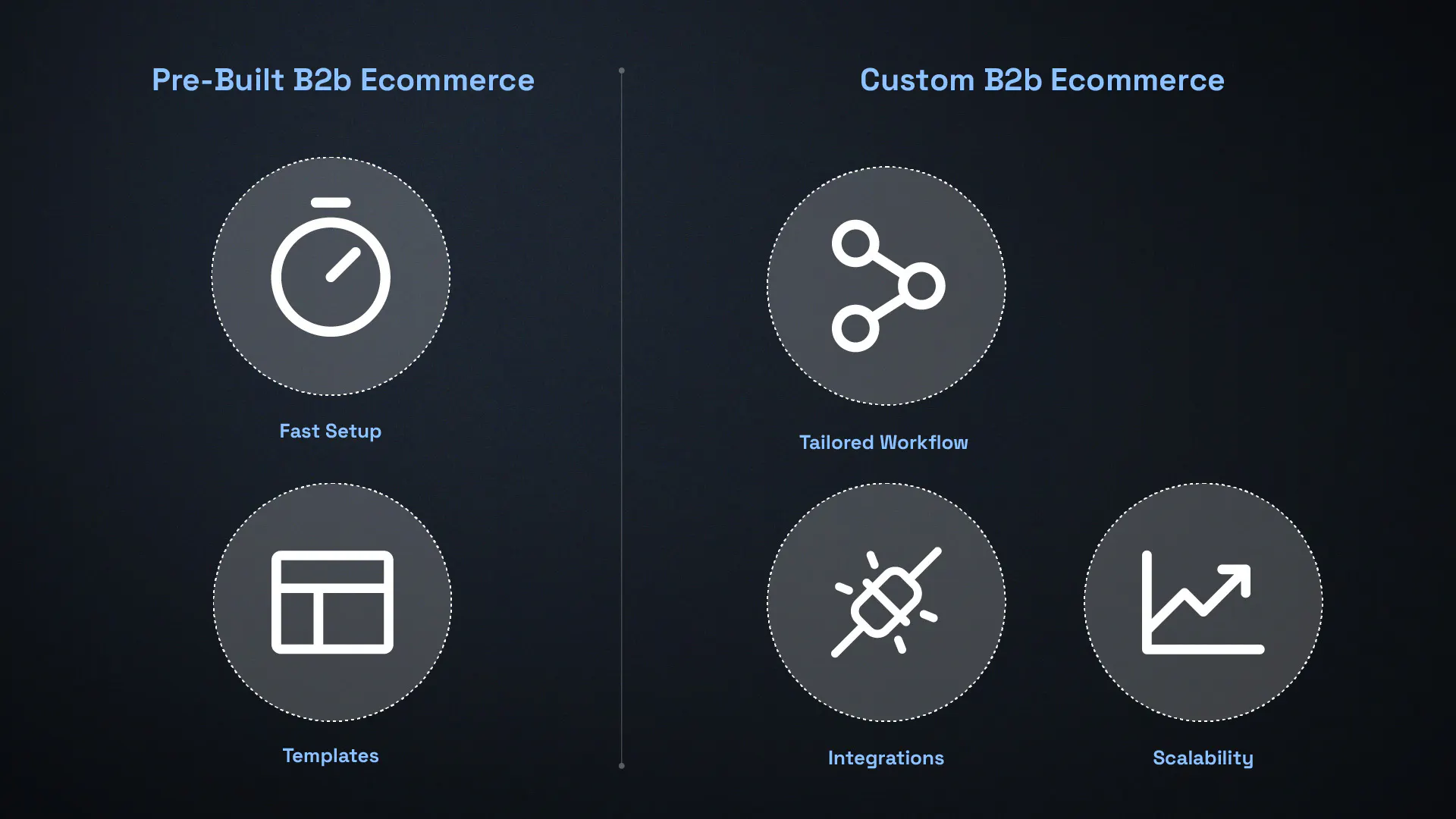Custom vs. Pre-Built B2B Ecommerce Websites
How to Select the Right Ecommerce Platform for Your Business

By Foster Commerce
Jul 15, 2025

Choosing the right B2B ecommerce platform is a major step for manufacturers, wholesalers, and distributors aiming to grow online. Whether you're considering a custom-built solution designed around your workflows or a pre-built option for quick deployment, understanding the tradeoffs can save time, money, and frustration.
This short article breaks down the practical differences between custom vs. pre-built B2B ecommerce websites. At the end, we discuss our unique hybrid solution which can help brands affordably align their platform choice with their goals, operations, and resources.
Understanding the Differences Between Pre-Built and Custom Ecommerce Website Solutions
When comparing pre-built platforms with custom ecommerce sites, it comes down to how much flexibility and control your business requires.
Pre-built platforms, such as Shopify Plus, offer a fast path to market. They come with standard features and minimal setup. If your product offerings and workflows are relatively simple, these platforms might be enough to get you selling online without a large investment of time or resources.
But speed can come at the cost of scalability. Pre-built platforms follow fixed structures, which can limit how much you can tailor the experience to your sales process or customer needs. Features like custom pricing models or account-specific catalogs may require add-ons or customized workarounds.
Custom ecommerce websites, on the other hand, give you the ability to build around how your business actually operates. Using tools like Craft Commerce or OroCommerce, you can define exactly how pricing, product configuration, inventory, and customer accounts should function. While this route requires more planning, the result is a system that works with your existing tools and processes, not against them.
This kind of flexibility is where a customizable ecommerce experience becomes essential—whether you’ve chosen a pre-built system or are going the custom route—for B2B teams managing complex workflows.
Here’s a quick comparison to help clarify the differences:
Pre-Built Platforms Prioritize Speed Over Flexibility
These platforms are ideal if you need to launch quickly with a standard feature set. They’re great for simpler catalogs and don’t require heavy technical oversight. However, custom workflows may prove challenging to implement when your business grows.Custom Ecommerce Websites Offer Tailored Functionality
A custom build allows you to design workflows and user experiences around your specific quoting, inventory, and fulfillment needs. This is especially valuable for B2B businesses that rely on detailed product specs, customer-specific pricing, or ERP integrations.Long-Term Scalability Favors Custom Builds
While pre-built platforms can get you started, they may introduce limitations down the road. Custom ecommerce websites are designed to evolve with your operations, reducing the need for major rework as your business expands.
Evaluating Ecommerce Platforms and Websites for Manufacturers, Distributors, and Wholesalers
For B2B operations, platform choice isn’t just about technical specs or user interfaces—it’s about solving day-to-day challenges.
Manufacturers often need precise inventory visibility, quoting tools, and sales workflows that may not be supported by off-the-shelf solutions. Distributors rely on layered pricing, multiple shipping rules, and real-time product data. Wholesalers need seamless bulk ordering and account management tools.
Many pre-built ecommerce platforms are built with B2C users in mind. That means essential B2B features, like ERP integration, RFQ processes, or tiered customer pricing, may be missing or limited.
At Foster Commerce, we've worked with clients in commercial equipment, home goods, and industrial supply who needed platforms built around their business logic. The recommendation is always the same: choose a platform that supports the way you quote, sell, and deliver, not just one built for generic ecommerce stores.
Integrating Custom Ecommerce Features to Meet Unique B2B Requirements
Off-the-shelf ecommerce systems may meet some, but not all, requirements for manufacturers, distributors, and wholesalers with specialized workflows. If your business manages negotiated pricing, handles dealer accounts, or needs robust backend connections, a standard solution may leave you patching gaps with third-party tools—which can get pricey.
A custom ecommerce website can bridge those gaps by supporting the way your business actually operates. Here are just a few examples of features custom builds can support:
Fully custom, branded designs
Create the precise look and feel your customers expect from your unique brand.Account-level permissions
Control access across departments, dealers, or buyer roles with tailored user roles and visibility settings.Custom RFQ and quoting tools
Streamline the quoting process by letting customers request detailed quotes directly from your site.Personalized product catalogs
Show the right SKUs, pricing, and specs to each customer group based on their contract or order history.Advanced search and filtering
Make deep catalogs more usable with smart filters, part matching, and real-time inventory cues.ERP, CRM, and logistics integrations
Automate data syncs and eliminate duplication by connecting your ecommerce website directly to business systems.
These features aren’t add-ons. They’re essential for delivering a seamless experience to B2B buyers who expect speed, accuracy, and reliability. Our approach to custom web architecture ensures those systems talk to each other seamlessly and reliably.
Website Development Considerations: Custom or Pre-Built Approaches to Budget, Timeline, and Resources
Once you understand which features you need, the next step is to look at the build process.
Pre-built platforms typically come with lower startup costs and require fewer development resources. If your team is lean and speed is a top priority, this path gets you to launch quickly. Just be sure to factor in the platform’s subscription and transaction fees, any third-party tools you’ll need, and future limitations. These pre-built solutions may work in the short term but can introduce constraints as your operations evolve.
Custom ecommerce websites involve more upfront work. You’ll be defining processes and requirements, planning integrations, and investing in development time. The timeline is longer, and your internal team will likely need to be more involved at the outset. But this approach often reduces friction down the line and avoids replatforming when your business grows beyond previous requirements.
Whether going with a pre-built or custom solution, we’ve seen the best outcomes when clients budget time for planning, documentation, and cross-department input early in the process. It saves effort later and results in a better user experience for your team and your customers. Need help? We can clarify and support every step of the website development process for you.
Choosing Between a Pre-Built Solution and a Custom Ecommerce Website: A Practical Checklist
If you’re still weighing your options, here are a few practical questions to ask:
Does your pricing model require logic beyond flat rates or simple discounts?
Do your customers expect account-specific catalogs or permissions?
Will you need deep ERP or CRM integrations?
Is your product catalog complex or highly configurable?
Do you anticipate adding features or channels over time?
If you answered yes to any of these, a custom ecommerce website may be the better fit. It gives you room to grow, adapt, and build digital infrastructure that supports your full business, not just your storefront.
If your needs are basic, and speed to market is more important than deep customization, a pre-built platform may still do the job. Just make sure to evaluate how long it will serve your business before you need to upgrade or rebuild.
How We Bring the Best of Custom & Pre-Built B2B Ecommerce Websites Together
Choosing between a pre-built or custom ecommerce website isn’t just a technical decision. It directly affects how efficiently your team operates and how well you serve your customers. Whether you need to streamline quoting, integrate with your ERP, or support dealer-specific workflows, your platform should work for your business, not force your business to adjust. The good news is, with our custom software and strategic development you might not have to choose between the extremes of either a pre-built ecommerce platform or something entirely built from scratch.
At Foster Commerce, we offer an innovative hybrid solution, Commerce Foundations, for businesses that need to both speed their time to market and have an easily customizable solution.
We specialize in building flexible, scalable ecommerce solutions for manufacturers, wholesalers, and distributors. From customized development to platform evaluations and long-term support, we help B2B companies create digital infrastructure that drives growth and reduces friction across the entire sales process.
If you're ready to build an ecommerce website that matches your operations and future goals, connect with us. We'll help you find the right approach, whether that’s refining what you have, going with a hybrid approach, or starting fresh with a solution that’s built to last.

